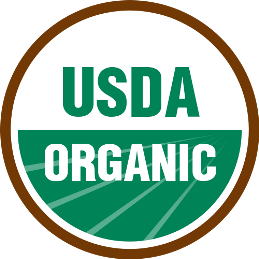It’s not uncommon to encounter a raised eyebrow or two when we tell people we try to buy organic when possible. The mere mention of the word ‘organic’ often conveys, to some people, images of tree-hugging hippies taking enough time off from bong smoking to put on some sandals and something tie-dyed, tie back their hair, grab their canvas bag and saunter off to the local Whole Foods, Earth Fare or Trader Joe’s for some tofu (what is tofu??) and fresh salad greens. Others think of organic as a realm reserved only for those rich enough to ‘blow’ money on ‘high-brow’ food that clearly costs more than it should. While there is definitely some truth behind such stereotypes, those images are rapidly changing. As more and more people become educated about what truly is IN the factory-food we buy and consume, buying organic is quickly becoming so much more than just a small niche or passing fad. It’s becoming mainstream.
You don’t have to be a rich yuppie or even a bong smoking hippie to buy organic food. You just have to understand, to really understand, a few things. Once you do some research and truly grasp these issues, you will never see food the same again.
1.) GMOs (genetically modified organisms) are in almost every non-organic processed food and even some raw non-organic vegetables and, more recently, salmon. In a nutshell, these mad-scientists modify the DNA of food to give it a particular attribute. For example, by modifying DNA, Monsanto created a brand of corn immune to their pesticide, RoundUp. Now RoundUp can be sprayed on whole crops, killing everything but the corn. Sounds great, right? Except that we are supposed to EAT that RoundUp saturated corn! How does that Twinkie taste now? (Yep, corn is in virtually every processed food, Twinkies included.) Sorry, but we’re not interested in anybody’s Franken-food.
The GMO issue is truly the most important issue of our time. It is so big, so broad, and so important that we strongly encourage anyone reading this to do their own research post haste. What you will find will truly boggle your mind (and probably make you very angry). In the meantime, for your own health and safety and that of your children, buy organic and avoid GMOs like they plague they are!
2.) Pesticides – Buying organic limits exposure to the various and sundry toxic pesticides non-organic growers use on their crops. They linger and seep into the food even after the food’s surface is washed. (There is no need to buy every fruit organic, however. Bananas and oranges, for example, have thick coatings that protect the inside against pesticides. Apples, strawberries, and grapes, on the other hand, are best bought organic.)
3.) Preservatives and other chemical additives – basically, if the ingredient list reads like a chemistry book, you probably don’t want it in your body! Although we encourage people to cook from the most basic, unprocessed organic ingredients possible, even processed organic foods have very short ingredient lists and are filled with mostly wholesome ingredients.
4.) Is it better to consume MORE toxins or LESS? We are exposed to toxins every day, from the air we breathe to what we touch, eat, and drink. These days cancer and other chronic diseases are sky-high, correlating perfectly with the increase of processed, factory-farmed, chemical laden food with altered DNA. If we can limit the toxins we put in our bodies by consuming organic food, might we increase our chances of being healthy? It’s really just basic common sense!
5.) Here’s the kicker – Organic (tofu aside) just plain TASTES better!
Now, why don’t more people buy organic? Yes it costs more, but not as much as you might think. For example, organic milk by the gallon only costs about 15-20% more than regular milk. A buck or so is a small price to pay to not have to consume bovine growth hormones, wouldn’t you think?
Here are some ways we buy organic without breaking the bank.
1.) Look for sales and coupons. The closest organic grocery store in our area is Earth Fare. They are always running internet coupons, coupon booklets, and special sales on a variety of products. Often they aren’t that far off from the mainline grocers.
2.) Close-out stores like Big Lots often stock organic products for a fraction of the original price. Check them out often because they are always getting new things.
3.) If you see a good deal on something, buy in bulk. This allows you the opportunity NOT to buy it when you see it the next time and it’s not on sale. Instead, spend the money on a bunch of something else that is discounted. Shopping this way can save a lot of money over time!
4.) Realize that you get what you pay for. Yes, over the long run you are probably going to spend more on organic food, but is it worth it?
Food is the most important purchase we make. Our bodies use it, every day, as fuel, to work, to play, to spend time with your family, to fight disease, to live life to the fullest. Why would we feed it anything less than the best?










Excellent article! I’m a first time visitor here, but I’m definitely enjoying your blog. If you need another way to convince people that organic is better, you can appeal to their taste buds. I wrote a how-to article for creating a taste test of organic vs. conventionally grown apples. The organic apples win every time I do this with a new group! Check it out at Nutrition for Healthy Kids – Organic Taste Test
Another good article!! I agree whole heartedly. My wife and I have done our home work on this. I really have a hard time finding something to buy off the shelf in a conventional supermarket anymore.
Brett